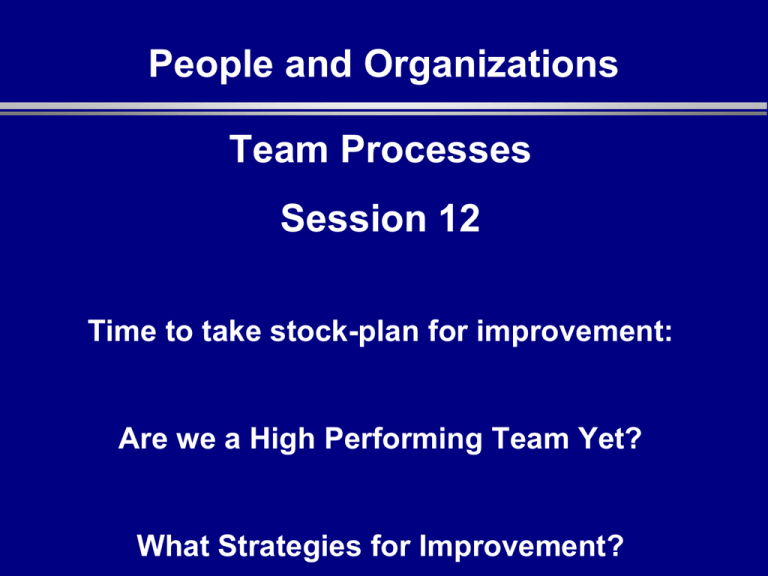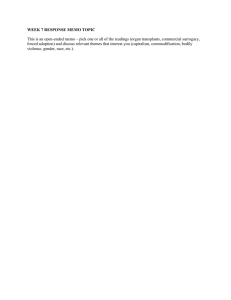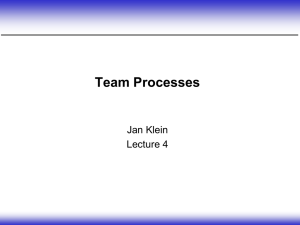People and Organizations Team Processes Session 12
advertisement

People and Organizations Team Processes Session 12 Time to take stock-plan for improvement: Are we a High Performing Team Yet? What Strategies for Improvement? Today’s Agenda Assess your table team— » Complete the survey » Compare results with baseline data Provide feedback to each other Build a strategy for team improvement Prepare one page improvement memo Generic Team Processes Communications—everybody participating? listening to all views? Influence—what tactics dominated? Task Functions—how do you organize? Maintenance Functions—holding the group together Decision-Making—what rules do you follow? Conflict Management—how resolved? Emotional Atmosphere—are you still talking? Communications—listening to all views? Who speak most often? – What is the effect of their participation? Who speaks least? – Why? What affect did this have? How are ―silent‖ and ―noisy‖ members handled? Influence Who has the most influence? Who has the least? What influence tactics have most effect? Rational persuasion Consultation Personal appeals Coalition tactics Legitimating tactics Inspirational appeals Ingratiating Exchange / reciprocity Pressure / intimidation Task Functions—how did you organize? How well are we facilitating our meetings? Initiating Seeking information / opinions Providing information or opinions Clarifying Elaborating Summarizing Consensus Testing Is everyone doing their fair share of the work????? Maintenance Functions How well are we holding the team together by: Harmonizing Compromising Gatekeeping Encouraging Who performed these functions? Decision-Making Are we using rational problem solving processes? – Identifying the problem, Analyzing the problem, Proposing and evaluating solutions, Implementing decisions How do we reach ―consensus‖? – How many people actively participate in decisionmaking? Conflict How did we handle disagreements? To what extent were there arguments about how to do the task? To what extent did team members take arguments personally? Are conflicts resolved or simply ―buried‖? Atmosphere and Emotional Environment Do we build a supportive environment? – Empathy, Equality, Spontaneity, Problem orientation Are members defensive if their ideas are challenged/rejected? – Evaluation / judging, Control, Stratagems / ―games‖, Superiority, Dogmatism? Do we all stay engaged or some withdraw (literally or physically? Are people involved and interested? – Is there an atmosphere of work? Play? Competition? Team Processes: Summary Points Managing Generic Process is Critical to Achieving a ―High Performance‖ Team Requires Conscious Effort and Practice Skills Skill Building Requires Clear, Honest Feedback Use the Tools—in your teams & elsewhere! Tips for Giving Feedback Emphasizes the positive and/or the future Is always civil and respectful— goal is to bring the other person to one's side rather than making the other defensive Not useful to speculate on the motives Wry, humorous feedback often works very well as long as it is not sarcastic or ridicules the other person. Is specific and factual. Uses examples. Couched in "I statements" ("I thought that you..." rather than "You did this...").It is stated or written in the ―first person‖ style as you would write a letter to a friend or colleague Do’s and Don’ts Say: “Yesterday when you and I worked on that assignment, you used the organizational culture lens well when you said….I learned a lot from you when you….” Or “Yesterday I got very angry with you when you came late to our team meeting and had not done your part of the assignment….” Don’t Say: “When doing our assignments the concepts about organizational culture are very effective…” Or ”Coming late and not doing the work often makes teammates angry…” Assignment Write down one bit of feedback for someone on your team. Then deliver it. Review your team survey data as a team Write a one page memo analyzing your: » Changes in team assessment since last survey – Have you improved? Why/How? Why not? – What concrete steps need to be taken to become a high performing team? – Develop an action plan around your team project Summarize and post your plan and make sure all team members have a copy of the memo and have buy-in to your strategy MIT OpenCourseWare http://ocw.mit.edu 15.668 People and Organizations Fall 2010 For information about citing these materials or our Terms of Use, visit: http://ocw.mit.edu/terms.



